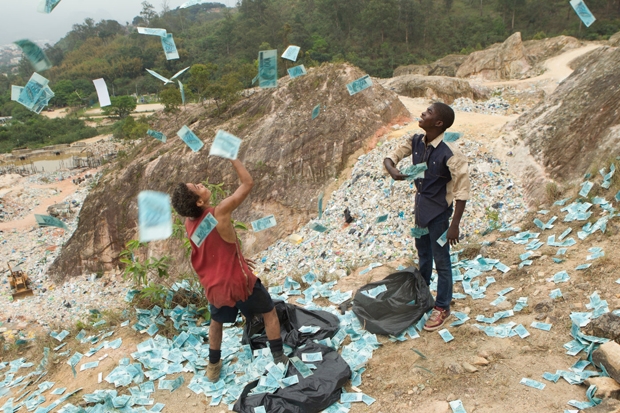Trash is the sort of film one desperately wishes to be kind about — heart supremely, if not burstingly, in the right place and all that — but it doesn’t make life easy for itself. Directed by Stephen Daldry, with a script by Richard Curtis, and set amid the kids who work the rubbish dumps of Rio de Janeiro, this aspires to combine (I think) the lively spirit and warmth of Slumdog Millionaire with the hard-hitting social agenda of City of God, but in working both angles, it doesn’t pull off either one. It also culminates in the most implausibly happy ‘feelgood’ ending known to man (and here I am being kind, because I could have added ‘or beast’, but did not).
The story, as based on the source novel by Andy Mulligan, follows three boys of 14 or thereabouts who live in a favela and daily scale the rubbish dump, collecting water bottles. They stumble across a wallet which, it transpires, the police are deeply interested in retrieving, and which will ultimately take them into the heart of a conspiracy involving a corrupt politician. The boys are played by real Brazilian street kids (Rickson Tevez, Gabriel Weinstein and Eduardo Luis), who speak only Portuguese (the film is subtitled). It’s not a struggle to be kind about any of these boys who are wonderfully energetic, charismatic and natural. Daldry can certainly coax terrific performances from youngsters, as he did with Jamie Bell in BillyElliot. But while the boys feel authentic, little else does.
Some aspects you are simply expected to buy, like the fact that, poor as they are, they would rather hang on to the wallet than turn it in for the reward, or the fact none of them has any family whatsoever; not a parent, sibling, aunt, uncle, cousin or second cousin once removed between them, and no mention that they might have ever had any. The only adult figure in their lives is Martin Sheen’s old American whisky priest, who has to deliver some of the most terrible lines ever. ‘Don’t pick battles that will make you bitter or dead,’ he has to say. But, presumably, one doesn’t know which battles will make you bitter or dead, until you have battled them, and are then either bitter or dead? Or even bitterly dead, if the worst comes to the worst? (See how unkind this film is forcing me to be?; see?) There is also an American aid worker, as played by Rooney Mara, who performs no real function, as far as I could gather, beyond being white and pretty and Hollywood.
The boys must go on the run, particularly from one nasty, ruthless police officer, while following the clues as contained in the wallet: a locker key, a flip book of photographs of a little girl, scribbles on the back of another photograph. The plot is as plodding as it is preposterous. Plod, plod, plod it goes, preposterously, while offering no suspense whatsoever, just one on-foot chase scene after another. These chases are a joy initially, as the boys are swift and as agile as monkeys, but by the seventh chase? Not so fun. The eighth? Enough already. I would even ask: who knew chases could prove so plodding? Who?
But, most crucially, this is just so tonally all over the place. It veers from kiddie caper to fairly explicit scenes of torture and extrajudicial killings before quickly reverting to kiddie caper again. It can’t get away from the torture and extrajudicial killings quickly enough, I would even say. This film wants to explore the tough life of these street kids and the violence and the endemic corruption, but as soon as events start getting gritty, Curtis (being Curtis) promptly bails out. For example, at one point one of the boys is beaten up brutally, and sadistically, by the police but by the next scene he just has a bump and a bruise, and the scene after that, nothing, and he’s fit to be chased again, whereas such a beating would have actually laid him out for weeks. Then there’s the favela, which is set on fire and razed to the ground, but produces no casualties, no injuries and no displaced persons, apart from the few that turn up at the church. As to the implausibly happy ‘feelgood’ ending, maybe I was too harsh, and it’s quite sweet really? No. It’s properly rubbish. Won’t even think about trying to be kind again. It just doesn’t suit.






Comments